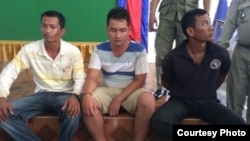A provincial court has determined it will hold three men accused of murdering a journalist on Sunday. Kratie court officials say they will detain La Narong, Kem Pheakdy and Pin Heng while an official investigation into the crime takes place.
The three men were arrested Sunday and are accused of murdering journalist Taing Try, who was in Kratie province investigating illegal logging.
International media advocates condemned the killing and called for a thorough investigation of his death.
“This is part of a pattern, I would say, in terms of increased harassment being directed at journalists who are trying to report on this topic in Cambodia,” said Karin Deutsch Karlekar, project director at the US-based Freedom House. “It’s very positive that they have arrested people quickly, but we would just encourage and urge that a full-ranging investigation be conducted into the killing and also to look into not just who performed the murder, but who also was behind that. Because in many cases—not just in Cambodia, but globally—there may be a prosecution of the person who actually pulled the trigger, but the mastermind often remains at large.”
In Cambodia, she noted, most media is controlled by the ruling Cambodian People’s Party and its supporters, creating a restrictive media environment. Murders of journalists create a form of self-censorship that enhances that environment, she said.
Bob Dietz, head of the Asia program at the Committee to Protect Journalists, said Cambodian journalists covering illegal mining and logging do so with little safeguards.
“A free press reporting on illegal logging might be able to stop that illegal logging, or bring the people who are doing it to justice and to have them either fined or jailed, or have them at least stop doing the logging,” he said. “But if you are not going to allow people to report on it, then that is going to continue, and the same thing applies to other illegal activities in Cambodia as well.”
Killing of Cambodian journalists—at least 12 since the 1990s—is aided by the country’s culture of impunity, he said. “Very few killers of journalists are brought to justice in Cambodia.”
T. Kumar, international advocacy director at Amnesty International, urged the Cambodian government to investigate this murder and take further steps to protect journalists.
“Any country when the press are not allowed to report freely and they are silenced, then it means it’s bad for the future of that country, in this case Cambodia,” he said. “We urge the government to ensure that journalists are protected.”
He too expressed concern that a culture of impunity and lack of rule of law would contribute to losses in media freedoms, including self-censorship.
“Definitely it will send a wrong message to the journalists that they should not cover certain stories,” he said.
Benjamin Ismail, head of the Head of the Asia Pacific section of Reporters Without Borders, called the murder part of a “worrying trend” for journalists trying to cover environmental issues, including illegal logging.
“Obviously the situation in Cambodia is not improving,” he said. “This case is clearly reminding us that the case of the murder of Hang Serey Udom, who was also an investigative reporter who was murdered during his coverage of illegal logging and of environmental issues.”
These “are very sensitive issues, for which at the moment there is complete impunity, for all the murderers of journalists and activists as well,” he said. He too urged a thorough investigation of the killing.






